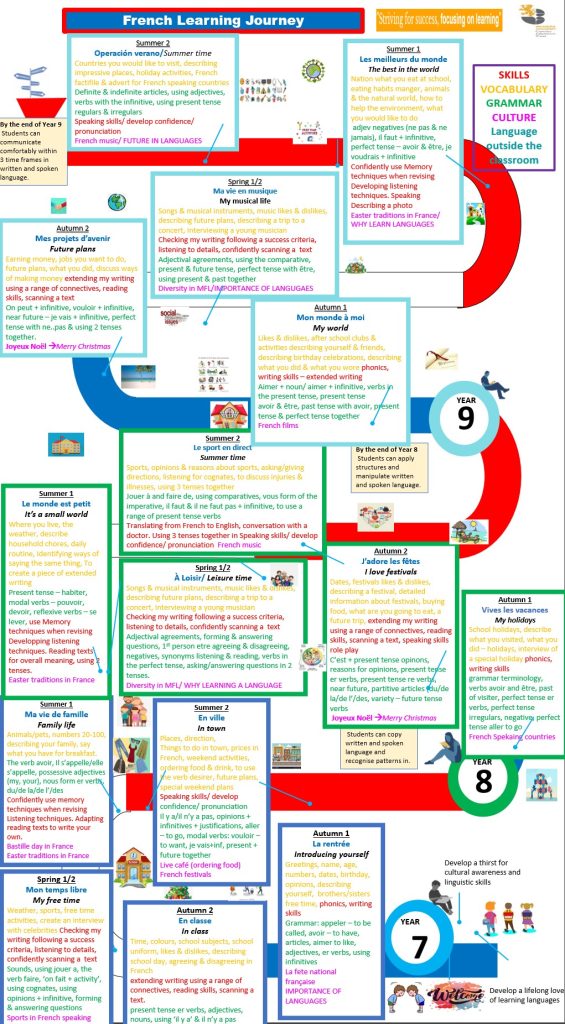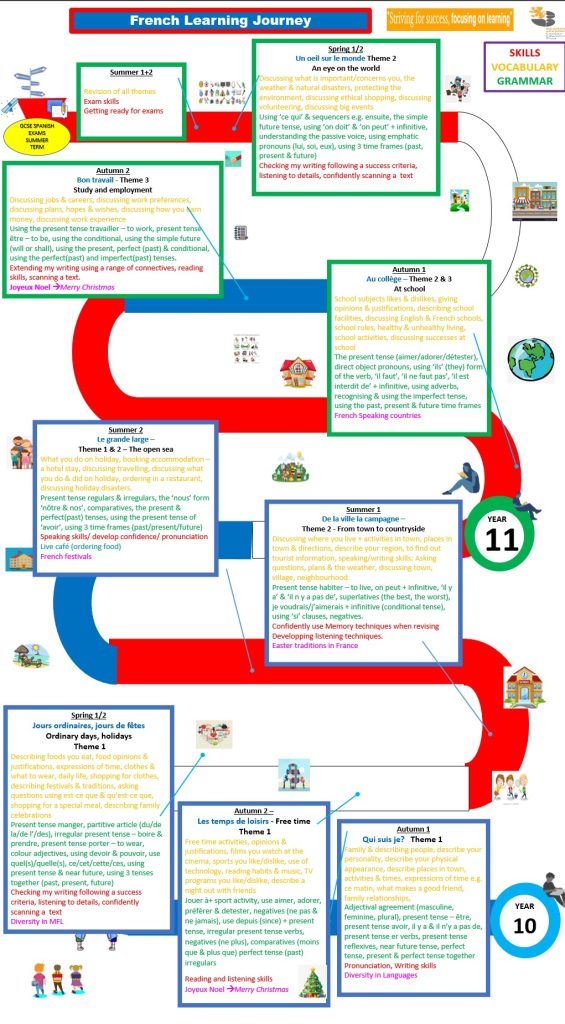French
Click here for learning resources
Key Stage 3:
Year 7: By the end of the year students will be able to demonstrate accurate use of French phonics with familiar and new words and phrases. They will be able to greet other, introduce and describe themselves and their families, tell the time, give clear opinions supported by reasons and have a simple shopping conversation with a stranger. They will be able to use a bi-lingual dictionary to look for new word meanings and check present tense verb conjugations.
Year 8: By the end of the year students will be able to talk about themselves and their lives and express opinions with reasons Students will be able to use some transactional language and some more formal register. They will be able to use three tenses (present, near future and preterite) and more complex structures (e.g. conditional, comparative, superlative). They will also develop their knowledge of Francophone culture.
Year 9: By the end of the year students will be able to talk about themselves and their lives but also about wider ranging issues (human rights, the environment, etc.). They will be able to use the language they would need for arriving in France and meeting French people. Students will be able to use three tenses (present, near future and preterite), plus the imperfect and simple future and they will develop their knowledge of Francophone culture
KS3 Curriculum Map

Key Stage 4:
Year 10: By the end of the year pupils will be able to confidently describe aspects of their home life including their family, relationships, school and where they live, and be able to speak about both past and future holidays. They should be able to use a range of grammatical structures to comprehend and describe both familiar and unfamiliar contexts, asking for information when they need it.
Year 11: By the end of the year pupils should be able to confidently operate in a range of contexts across all 4 skills. They should be able to understand and describe local as well as global issues such as the environment, and be able to comprehend and describe their future plans and careers.
Students study all of the following themes on which the assessments are based.
Theme 2: Local, national, international and global areas of interest
Theme 3: Current and future study and employment
GCSE Spanish/ French has a Foundation Tier (grades 1–5) and a Higher Tier (grades 4–9). Students will take 4 papers (listening, reading, writing and speaking). Students must take all four question papers at the same tier. All question papers must be taken in the same series.
| What’s assessed | How it’s assessed | Weighting | |
| Paper 1: Listening | Understanding and responding to different types of spoken language | Written exam: 35 minutes (Foundation Tier), 45 minutes (Higher Tier) 40 marks (Foundation Tier), 50 marks (Higher Tier) |
25% of GCSE |
| Paper 2: Speaking | Communicating and interacting effectively in speech for a variety of purposes | Non-exam assessment 7–9 minutes (Foundation Tier) + preparation time 10–12 minutes (Higher Tier) + preparation time 60 marks (for each of Foundation Tier and Higher Tier) Role-play – 15 marks (2 minutes at Foundation Tier; 2 minutes at Higher Tier) Photo card – 15 marks (2 minutes at Foundation Tier; 3 minutes at Higher Tier) General conversation – 30 marks (3–5 minutes at Foundation Tier; 5–7 minutes at Higher Tier) |
25% of GCSE |
| Paper 3: Reading | Understanding and responding to different types of written language | Written exam: 45 minutes (Foundation Tier), 1 hour (Higher Tier) 60 marks (for each of Foundation Tier and Higher Tier) |
25% of GCSE |
| Paper 4: Writing | Communicating effectively in writing for a variety of purposes | Written exam: 1 hour (Foundation Tier), 1 hour 15 minutes (Higher Tier) 50 marks at Foundation Tier and 60 marks at Higher Tier |
25% of GCSE |
KS4 Curriculum Map:
